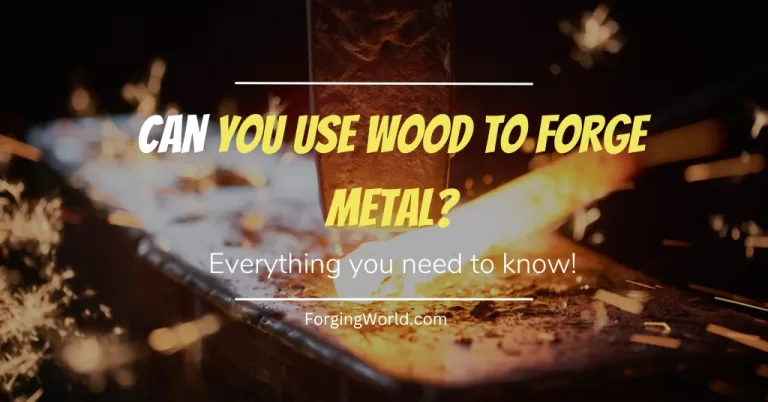The flooring surface on which blacksmith stands plays a crucial role in his/her health and productivity. Wrong flooring choice can be dangerous on various levels, from developing a minor injury to burning the whole shop. That is why it is vital to choose the right option.
So, what flooring option is best for a blacksmithing workshop?
Dirt, concrete, and brick are typically the best flooring options for a blacksmithing shop. While dirt may be the cheapest, it is also the least stable option. On the contrary, concrete and brick flooring are easier to clean and allows for greater stability. However, standing on concrete flooring for a prolonged period may cause joint problems.
As you can see, there is no single definite answer. Each of those three options has its benefits and downsides. Next, we will discuss each of them in greater detail, so at the end of the article, you can decide which option is best suitable for you.
Okay blacksmiths, let’s start with the first one.
Dirt Flooring for a Blacksmithing Shop
A dirt floor is present for hundreds of years in a blacksmithing shop. Actually, before concrete and bricks, dirt flooring was the one and only option. In most movies and TV shows, the chances are also that you saw a blacksmith standing on a dirt floor in his workshop.
So, if you think of yourself more of a traditional blacksmith, dirt flooring is the ideal choice. Besides that, dirt is the cheapest option of all. It doesn’t require any installation; it is typically already there. One of the greatest benefits of dirt flooring is that it has a much lesser negative impact on joint pain.
Namely, standing in front of an anvil and striking the hammer for an extended period is already very exhausting. Taking this into account, adding the hard standing surface makes it very hard to work safely and effectively. When you hit the hammer, dirt absorbs some amount of the force, which makes it easier on your feet, whereas a concrete floor does not.
So, for example, a person that has flat feet, having the dirt floor, may actually be a superior option. While this effect may not be noticed immediately, after some time, it definitely will.
Having dirt floor also makes it much simpler to mount the anvil stand. Only a few feet of digging makes it more than sufficient for a stable base. You can say that the dirt floor is pretty versatile as you can dig a hole anywhere you desire to set posts and blocks. On the other hand, it is not suitable for moving heavy things placed on rollers or casters.
The downside of having dirt flooring is that you cant install power tools like power hammers and drill press. The mounting of these power tools requires a nice and solid surface like concrete. So, if you have a dirt floor but you also want to mount a power hammer, be sure to make a good concrete foundation on the desired place.
Another problem with dirt flooring is they get dusty so you can lose some small pieces of metal buried in it. Most of the time, these little pieces are just scrapped, but sometimes it can be an important part you really need. Inhaling of an excessive amount of dust is harmful to our body, so it is a good idea to clean it every often or so.
We recommend that at the end of each working day in a shop, you clean the dirt floor. Except for minimizing the amount of dust, you also remove every sharp piece of metal. Keep special attention on a day when you are making nails.
Also, you often get hollow spots, which are often very inconvenient to stand on. As you may already assume, the dirt floor heavily depends on the weather. So, if it rains, make sure you have prepared boots for that day due to the mud. If your shop does not have a door, things get much worse, so keep that in mind.
Benefits of Dirt Flooring for Blacksmithing
- Easy maintenance
- Cheap
- Doesn’t require installation
- More comfortable to stand on
- Easy on your feets
- Versatile
Disadvantages of Dirt Flooring for Blacksmithing
- Doesn’t support heavy machines
- Fast accumulation of dust
- Weather dependable
- Dirty
- Not levelled
Concrete Flooring for a Blacksmithing Shop
Concrete flooring is the most popular option in today’s modern blacksmithing shop. Unlike dirt, concrete must be properly installed. Except for being extremely strong, it is also a very durable flooring option. It will last a long time until it slowly begins to be destroyed.
For those who are more of an artistic soul, concrete offers a lot of diverse design options. Since this is an article about setting up a blacksmithing shop, that is of much lesser importance. The concrete is leveled, which makes it superior over the dirt option in this regard.
Unlike dirt floor, concrete is ideal for mounting heavy power tools like power hammers, hydraulic presses, drill presses, and similar others. It provides a solid foundation without any worries about moving.
One more good thing about concrete is that you can easily bolt down heavy machines. For example, to mount an anvil stand on concrete, all you have to do is to bolt it down. On the other hand, mounting the anvil stand on the dirt requires digging a hole a few feet deep and insert the stand.
Concrete is very damage resistant, so there is no need to worry if you drop a hot piece of metal. While concrete can chip or scratch at the surface, that would have to be a very strong piece of metal dropping and damaging it. The advantage of having concrete flooring in the shop is that it is extremely easy to clean and maintain.
On the other side, concrete is hard to stand on, especially for a long period of time. Standing and striking the anvil produces a lot of stress on your body as concrete doesn’t absorb any force. People with flat feet know that very well.
If you are one of the people who have flat feet, make sure to put inserts. Otherwise, it will be nearly impossible to work on without experiencing a lot of pain and discomfort.
On concrete, you can place heavy things on casters or rollers and move it without a problem, whereas with a dirt floor would be nearly impossible.
In terms of installed cost for concrete flooring, the price for basic design varies somewhere between $2 to $6 per square foot. That typically includes pouring the slab and basic polishing. A great number of factors dictate the final price installed concrete.
These usually include the size of the workshop, obstacles, design and many others. Some of them like design, you can control, but others like the size of the shop and obstacles you cannot. Usually, the larger the workshop, the lower the cost per square foot it is. Also, the more complex your project is, expect the higher cost for both labour and materials.
Here is an interesting fact about the history of concrete prices, according to NRMCA (National Ready Mixed Concrete Association)
- 2018: $113 per yard
- 2016: $108 per yard
- 2014: $98 per yard
- 2013: $93 per yard
- 2008: $75 per yard
Concrete flooring is not dependent on the weather like a dirt floor, for example. So, it doesn’t matter if it is raining or snowing outside, you can work undisturbedly.
We personally have a concrete floor, and we could not be happier with it. It was already there for ten years when we entered the shop and still serves us well up today.
Benefits of Concrete Flooring for Blacksmithing
- Levelled
- Hard
- Durable
- Relatively inexpensive
- Easy to maintain
- Provides a hard and stable base for heavy machines
- Not weather depended
- Damage resistant
Disadvantages of Concrete Flooring for Blacksmithing
- Hard on the feet
- Not comfortable to stand on for a prolonged period
- Susceptible to moisture
- Versatility
Brick Flooring for a Blacksmithing Shop
Brick is also a widespread flooring option in blacksmithing shops. It is one of the oldest building materials in the world, developed as a substitute for stone. It is usually made from earthen clays and then dried or fired in order to to be hardened.
Typically, floor bricks are thinner than wall bricks, about 1 inch thick. Floor bricks are best suited for installation over concrete, mainly due to the large mass. One of the biggest advantages of having the brick floor is that it is extremely easy to clean and maintain.
When it comes to installation, the brick floor is ideal for installing over the concrete or very hard wood floor. We recommend sealing the floor after it has been install and renew it every few years.
The great news is that you don’t have to buy new bricks for your blacksmithing shop. Used bricks in good condition are usually sufficient. Actually, more and more people are using used bricks instead of buying new ones.
The biggest advantage of using any old bricks is the fact that they are cheaper than buying brand new bricks. By looking at a single piece, the difference between the two is small, but when you look at the bulk price, the difference is noticeable.
Although not as hard as concrete, the brick floor may still be hard for some people to stand for a long period of time. If you are a full-time blacksmith, striking the anvil for 8 hours per day can be hard on your feet, knees, and lower back. Since the brick floor is softer than concrete, the effect is not that high.
One of the downsides of having a brick flooring in the blacksmithing shop is that you cant bolt anything down. Unlike concrete, bricks are more susceptible to cracking when bolting something down. To avoid that problem, pour the concrete at places on which you plan to mount power tools like power hammer and drill press.
Also, don’t be surprised if the bricks crack when something falls on the ground. Although bricks are considered a very durable flooring option, they are still no damage resistant as a concrete floor. The brick floor is also less slippery than concrete, which is another benefit.
Installation of the brick floor usually costs somewhere between $3 and $10 per square foot.
Benefits of Brick Flooring for Blacksmithing
- Easy to clean
- Inexpensive
- Durable
- Hard
- Not weather depended
Disadvantages of Brick Flooring for Blacksmithing
- Usually hard on the feet
- Tend to crack
- Cant bolt down anything
While choosing the right flooring option for your blacksmithing shop is important, it definitely isn’t the most important. As you can see, you can forge on every flooring option, it is just a matter of personal preferences and type of work you are doing.


